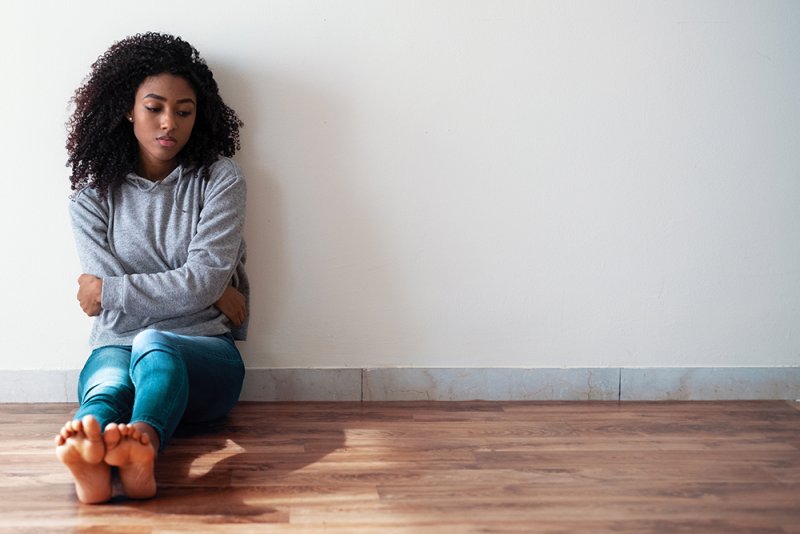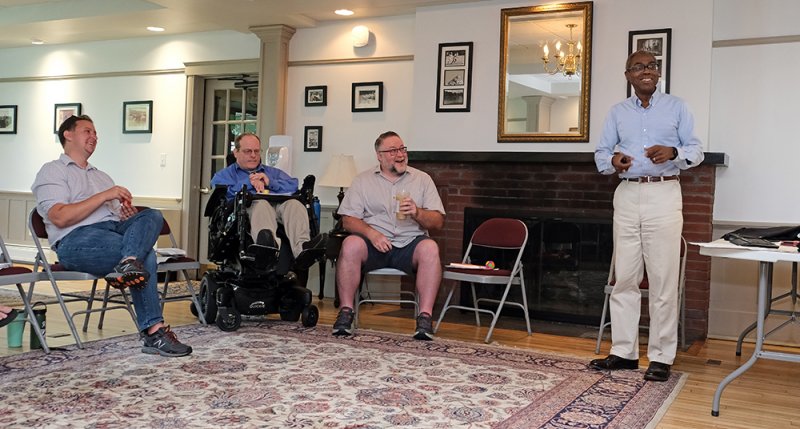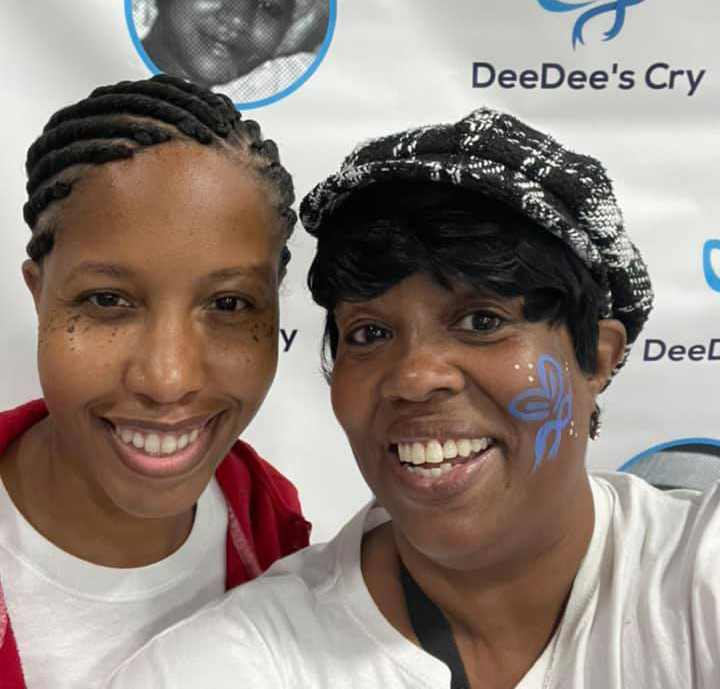
Ronelle Tshiela watched George Floyd die countless times. She saw him struggle for air while a Minneapolis police officer pinned him to the street. Floyd’s words, “I can’t breathe,” reverberated with her.
At a certain point, Tshiela had to turn it off.
“I’m thinking, no, this is going to make me break down crying. It’s going to make me have a panic attack,” says the co-founder of Black Lives Matter Manchester.
The video of Floyd’s final moments disturbed many. It triggered feelings of grief and pain. While anyone trying to move through grief may endure shock, anger and isolation, for those in the African American community, that experience is compounded by intergenerational trauma, according to Tashel Bordere of the University of Missouri-Columbia.
Bordere researches bereavement and resiliency within marginalized communities. She’s studied how this inherited pain—caused by racist violence, health disparities, high rates of poverty, unemployment and more—can affect the physical and mental health of African Americans.
These perpetual stressors and hardships can complicate the process of mourning, whether from a personal loss or a public tragedy, Bordere says. For people of color in NH, there can be added hurdles to healing and getting the help they need from a health care system that doesn’t reflect their needs. Outside the state, people have formed their own groups to fill in the gaps left behind by public and private institutions.
Suffering in Silence
Tshiela, who enters the University of NH’s Franklin Pierce School of Law this fall, recalls shutting down emotionally in high school after her grandmother died. “I just kind of stopped participating in activities,” she says. “I stopped going to school for a few weeks.”
More recently, the viral video of Floyd pleading for his life haunts her. She’s reluctant to discuss this trauma with a counselor. “That is a testament to how not only Black people are treated in the medical field, but how our culture has led us to believe that it is taboo to either talk about the issues or seek help,” she says.
Hundreds of years of mistrust of the medical establishment prevent some people of color from accessing health care, says Nicole Sublette, a psychotherapist based in Concord and a board member of the National Alliance on Mental Illness in NH or NAMI-NH.
She’s referring to events like the infamous Tuskegee Study, run by the federal government from 1932 and 1972. In it, Black men with syphilis in rural Alabama were left untreated so scientists could observe the effects of the deadly disease.
The aversion to seeking help also has its roots in African American history, according to Bordere. “Historically, if you think about it, there was really little space, little refuge for grief, when Black people of African ancestry were forcibly brought here,” she says.
Whatever traumatic events they experienced as slaves —from losing their children to witnessing violent deaths—they were forced to put their grief aside and get back to work. It became a way of life, passed down in families, according to Bordere.
She calls that lingering, historic pain “disenfranchised grief.”
Of course, not all of the grief caused by societal injustice is historic. Bordere says Black men are currently at higher risk for homicide and suicide than other populations. African Americans also face greater battles within the health care system when fighting diseases such as obesity, hypertension, diabetes and asthma, according to the U.S. Department of Health and
Human Services.
Because of these chronic conditions, higher rates of hospitalizations and deaths from COVID-19 have disproportionately affected the African American communities, according to the Centers for Disease Control and Prevention.
From a young age and across their entire lives, African Americans have “this persistent experience of lack of safety,” Bordere says. “For many Black populations, the pandemic was just one layer on top of a whole lot of other disenfranchised experiences.”
Turning to God
For generations, many have sought solace in their faith.
Growing up in the South in the ’50s and ’60s, minister and education director Olga Tines of New Fellowship Baptist Church in Nashua developed mechanisms to process outrage at the repeated lynchings around her.
As a young teen, she remembers staring at the grotesque images of Emmett Till’s mutilated body in Jet magazine. The 14-year-old African American was kidnapped, beaten and thrown in a river in Mississippi in 1955. Despite witnesses, Till’s killers were acquitted.
Tines never forgot. She found an outlet for her grief about Till and her brother’s death from colon cancer in her gospel choir and Bible study groups. “It isn’t that you become immune to it, but you learn to deal with it,” says Tines.
Nashua Alderman and state Rep. Linda Harriott-Gathright also sought comfort in her church after losing loved ones. Outside of the church, she didn’t feel able to express her sorrow. As a Black student in an integrated public school, she says she didn’t have the privilege of shedding tears in class and getting the teacher’s sympathy.
“Even though I might have felt like crying, I wouldn’t have,” says Harriott-Gathright, who grew up in Philadelphia.
Let Down by the System
According to NAMI, one in three African Americans who need mental health care receives it, despite a similar rate of mental health illness among other populations. When people of color seek out care, the quality is often lower and less likely to be culturally sensitive.
Those who do seek help can find a system that isn’t built for their needs. Sublette says researchers typically measure the effectiveness of mental health therapies on socioeconomically middle-class white people, ignoring more culturally
sensitive approaches.
“One thing [I] heard from my BIPOC [Black, indigenous, people of color] clients is that they’ve gone to treatment, and they’ve had these really terrible experiences,” she says.
Even support groups, when they are predominantly white, can be a challenge, Sublette says. Group therapy can make participants feel vulnerable and it can be hard to “express that vulnerability, with faces that don’t look like their own,” she says.
Connecting with a therapist can also be problematic. “You want [a therapist] who understands. You want someone you feel comfortable with,” says Erika Perez, co-founder of Black Lives Matter Manchester and legislative organizer for the NH Youth Movement. “But we lack the resources for that.”
NAMI-NH lists mental health resources for BIPOC and Asian American and Pacific Islander individuals on its web page. Under its subhead for treatment directories is the Black Emotional and Mental Health Collective. In NH, none exist. The Psychology Today Directory of African American Therapists lists two therapists of color located in the state.
The task of connecting with a therapist shouldn’t feel political, says Perez. Yet, attitudes about the Black Lives Matter movement are a game-changer. “If I find somebody, and they don’t agree my life matters, then how am I supposed to talk to this person about the problems in my life that intersect with racism?” she asks.
Another problem stems from training—too few therapists have been taught about managing historical trauma and its effect on bereavement, according to Ken Norton, executive director of NAMI-NH. Behavioral health teams exist under NH’s health department to respond to disasters, but there’s nothing like a “bereavement SWAT group” that reacts to racist trauma.
“In many ways we’ve left it to faith communities to be the lead on processing some of that information,” he says.
This year, the pandemic added a radical dimension to the grief journey, with funeral parlors closed and traditional supports such as community centers and religious institutions shutting their doors. Most mental health therapists did not offer in-person meetings, and many were not taking on new patients.
Outreach Requires Grassroots Efforts
To encourage access to care, health care organizations should reach out to the community, says Sublette. “Go to where people are gathering,” she says.
Many health care organizations don’t know how to reach out to people of color, says James McKim, president of the Manchester NAACP and managing partner of Organizational Ignition, a business consultancy. “They [never] even thought about it,” says McKim. “Until now. Until George Floyd.”
McKim and Organizational Ignition conducted a series of workshops to increase diversity, equity and inclusion with Network4Health (N4H), a collaboration of more than 40 area health care providers.

James McKim, president of the Manchester NAACP, right, facilitating a retreat. Courtesy photo.
Results from a survey he sent out to N4H members demonstrated they recognize the need to improve diversity efforts but lack direction for how to achieve it.
Hiring professionals of different colors, races, religions and sexual orientations has been at the forefront of the recruitment strategy for the Mental Health Center of Greater Manchester, according to spokesperson Rik Cornell. Among its 467 staff members, around 10% identify as minorities. “We’re diverse, but in a very small way,” he says.
To reach more people of different races and backgrounds, the center’s counselors work in the local public schools. They focus on building relationships with parents and children, referring them to external therapists as needed.
Creating a Community Solution
Grassroots efforts like DeeDee’s Cry can fill in the gaps for communities of color. Toy Burton of Roxbury, Mass., launched the nonprofit named for her sister in 2018 to promote mental health awareness. DeeDee died by suicide in 1986 at age 26.
The shock of DeeDee’s death spiraled Burton, then 17, into a depression. She struggled for decades with drugs, alcohol abuse and her own suicidal ideations. Now in her mid-50s and sober for 23 years, the African-American grandmother teaches preschool in Dorchester, Mass.
About four years ago, a former coworker reached out to Burton for help in finding a support group after her brother died from suicide. Burton tried to locate grief groups or events targeting suicide loss and mental health for Boston’s communities of color. She found none.
“I kinda got angry because nobody looked like me, and the places they were having their events weren’t places that I would travel to,” she says.
So Burton created her own events. In 2018, her nonprofit began hosting the annual Hop for Suicide Awareness and Easter Egg Hunt at Franklin Park in Boston. Burton says the free event brings in families for fun activities while also connecting them to mental health resources.
“There’s no shame,” Burton says. “They [the families] don’t have to go to a facility.”

Brand Brooks, director of operations, left, and Toy Burton, founder, right, of DeeDee’s Cry. Courtesy photo.
Every Friday, DeeDee’s Cry offers a Facebook Live five-minute mental health check in. Later this summer, the organization will hold other in-person events to promote mental health awareness.
DeeDee’s Cry offers mental health resources, seminars, suicide loss support groups, teacher training and online “Mental Health While Black” conversations throughout the year.
To get in touch with DeeDee’s Cry, visit deedeescry.com or call 617-410-8693. For 24/7 emergency support, contact the National Suicide Prevention Hotline at 800-273-TALK (8255).
These articles are being shared by partners in The Granite State News Collaborative as part of our race and equity project. For more information visit collaborativenh.org.

 Current Issue - April 2024
Current Issue - April 2024